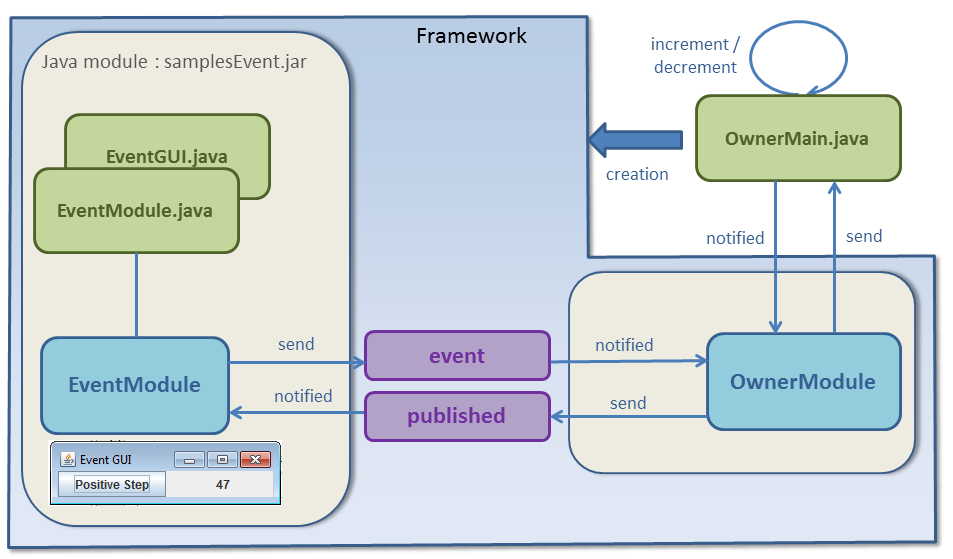Home
Categories
Dictionary
Glossary
Download
Project Details
Changes Log
What Links Here
FAQ
License
FrameworkOwner tutorial
1 Overview
2 Architecture
3 XML configuration
4 Code the FrameworkOwner
4.1 Creating and starting the framework
4.2 Subscribing to the event service
4.3 Sending cyclically the published service
4.4 Complete code for the FrameworkOwner
5 Starting the application
6 See also
2 Architecture
3 XML configuration
4 Code the FrameworkOwner
4.1 Creating and starting the framework
4.2 Subscribing to the event service
4.3 Sending cyclically the published service
4.4 Complete code for the FrameworkOwner
5 Starting the application
6 See also
The first tutorial presented the coding and configuration of a very simple system with two modules. In this Framework Owner tutorial, we reuse the implementation of the first tutorial, but we replace the
The framework will be created and started by the Framework Owner application, and all the code which was performed in the

PublishModule by an Owner module.The framework will be created and started by the Framework Owner application, and all the code which was performed in the
PublishModule will be performed in this FrameworkOwner application.
Overview
In the first tutorial, we had two modules:- The
PublishModulemodule increments or decrements a value cyclically - The
EventModulemodule allows to click on a toggle to set if the first module should increment or decrement the value, and shows the value
PublishModule module at the configuration level by an Owner module. The framework will be created and started by a Java class which will implement the Framework Owner interface.
Architecture
We won't change anything for theservices configuration of the first tutorial, but we will replace the PublishModule in the applications configuration by an Owner module:- The
eventApplionly contains theEventModule. This Module: - sends the
eventservice - subscribes to the
publishedservice - The
publishApplionly contains the Owner module. This Module will defer all calls to our Framework Owner class which will be notified for: - sending cyclically the
publishedservice - being notified from the
eventservice

XML configuration
We will only change theapplications.xml XML file, by replacing the previous PublishModule configuration by an ownerModule:<applications> <application name="eventAppli" id="1"> <modules> <module name="EventModule" id="1" > <implementation path="org.da.samples.protoframework.event.EventModule" > <initEntryPoint method="init" /> <defaultReceiveEntryPoint method="subscribe" /> </implementation> <interfaces> <eventSend service="event" attach="attach"/> <subscribe service="published" /> </interfaces> </module> </modules> </application> <application name="publishAppli" id="2"> <modules> <ownerModule name="PublishModule" id="1" > <interfaces> <eventReceived service="event"/> <cyclic service="published" frequency="200ms" attach="attach"/> </interfaces> </ownerModule> </modules> </application> </applications>
Code the FrameworkOwner
The FrameworkOwner must implement the FrameworkOwner interface. We will create anOwnerMain class which will:- Create and start the framework
- sends cyclically the
publishedservice - subscribes to the
eventservice
Creating and starting the framework
We will create and start the framework in theMain method of our new class. The "config" key will specify the Framework configuration.public static void main(String[] args) { URL config = <the URL of the framework configuration> OwnerMain owner = new OwnerMain(); Framework framework = new Framework(owner); framework.setup(config); framework.start(); }
Subscribing to the event service
public void init(OwnerModule module) { eventService = module.getService("event"); publishService = module.getService("published"); } @Override public void subscribe(ServiceInstance service) { boolean evt = eventService.getData("event").getValueAsBoolean(); if (evt) { step = -1; } else { step = 1; } }
Sending cyclically the published service
public void publish(ServiceInstance service) { publishService.setDataIntValue("value", count); count += step; publishService.invoke(); }
Complete code for the FrameworkOwner
public class OwnerMain implements FrameworkOwner { private ServiceInstance eventService = null; private ServiceInstance publishService = null; private int count = 1; private int step = 1; public OwnerMain() { } public void init(OwnerModule module) { eventService = module.getService("event"); publishService = module.getService("published"); } public void subscribe(ServiceInstance service) { boolean evt = eventService.getData("event").getValueAsBoolean(); if (evt) { step = -1; } else { step = 1; } } public void publish(ServiceInstance service) { publishService.setDataIntValue("value", count); count += step; publishService.invoke(); } public static void main(String[] args) { URL config = <the URL of the framework configuration> OwnerMain owner = new OwnerMain(); Framework framework = new Framework(owner); framework.setup(config); framework.start(); } }
Starting the application
As soon as the application is started, the framework will be started. Note that you should put the framework on the classpath of your application.See also
- First tutorial: The first tutorial present the coding and configuration of a very simple system with two modules
- Framework Owner: This article explains how to create and control the framework from an external application
- Owner module: The Owner Module is a unique Module which allows the framework to be created and controlled from an external application
- Tutorials: This tutorial reuse the first tutorial, but the two modules are in two different framework instances
×
![]()
Categories: tutorials